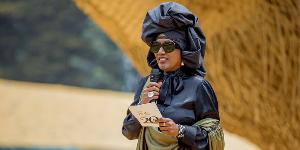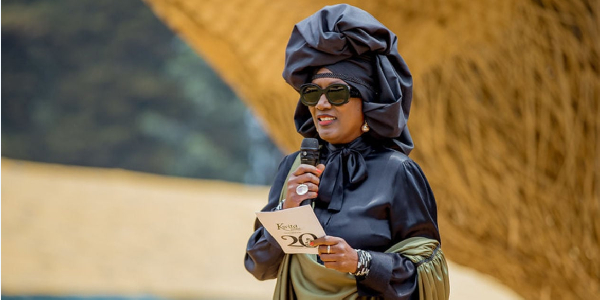 Burundian musician, Nina Khadja at the Rwanda gorilla naming ceremony on September 5, 2025.
Burundian musician, Nina Khadja at the Rwanda gorilla naming ceremony on September 5, 2025.
Several Burundian celebrities – both abroad and in Rwanda – are rushing to acquire Rwandan citizenship, even as relations between the two countries remain strained. The trend has sparked backlash in Bujumbura, where critics view the move as politically charged.
Rwanda and Burundi have endured tense ties for nearly a decade, with borders closed since the failed 2015 coup in Bujumbura. Burundian authorities accused Rwanda of involvement and of sheltering those behind it.
In September alone, more than 30 Burundians were granted Rwandan citizenship, with some declaring Rwanda their “foster home forever.” Among them is Nina Khadja, the Burundian singer born Jeanine Ntiruhwama, who announced she had chosen Rwanda as her new home –an act critics in Burundi described as betrayal.
Khadja, celebrated for her Swahili and Kirundi music, is married to Belgian racing legend Jacky Ickx, known for his Formula One career and six Le Mans victories. Earlier this month, she joined global stars at Rwanda’s gorilla naming ceremony, where she declared: “I was born and raised in Burundi, but I have chosen Rwanda as my home forever.”
Her statement, delivered as a Grammy nominee with global stature, drew sharp reactions from Burundians who saw it as disloyal.
Another prominent figure, DJ Ira (Devine Iradukunda), one of Rwanda’s leading female disc jockeys, publicly requested citizenship from President Paul Kagame. Recalling her first visit to Rwanda in 2015 after fleeing Burundi as a refugee, she told Kagame: “I found blessing in this country, so my request is to be granted Rwandan nationality, so that I can also be called a Rwandan citizen and become all yours.”
The President responded on the spot: “In principle, I grant it to you. The rest can be followed up with due process.”
According to government figures, Burundians accounted for 42 per cent of all approved citizen applications this year.
Social and political commentator Gonza Muganwa said the surge is rooted in cultural affinity and economic opportunity.
“The main reason is cultural. It is easy for Burundians to integrate into Rwandan society because the languages are similar. It is also easy for Burundians with means to invest in Rwanda, where their property is protected,” he explained.
Rwanda’s recognition of dual nationality and reputation for stability has further encouraged applications—particularly among the affluent seeking a second passport.
Footballer Karim Nizigiyimana, capped 39 times for Burundi and whose career spanned clubs in Uganda, Rwanda and Kenya, was also granted Rwandan citizenship. However, this came late in his career, when switching national teams was no longer an option.
Despite political rifts, Rwanda and Burundi remain bound by history and culture. Once a single Belgian colony, their languages are mutually intelligible, easing Burundian integration in Rwanda.
Today, Rwanda hosts more than 51,000 Burundian refugees, most of whom fled after the 2015 coup attempt against Pierre Nkurunziza.
Although many refugees have returned home under bilateral agreements, relations between the two countries have soured again amid accusations of cross-border interference.
According to Rwanda’s Ministry of Emergency Management, refugees continue to rely on international aid for food, shelter, and healthcare. Overall, Rwanda shelters 134,769 refugees, the majority from the Democratic Republic of Congo.

